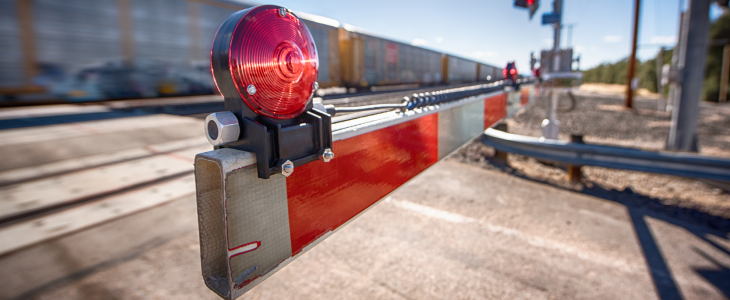Railroad crossings present a unique challenge for all drivers but pose particular risks for trucks and other large commercial vehicles. Intersections at which massive trains meet with highway traffic create a potentially dangerous situation that requires careful attention and specific safety measures. Trucks at these intersections must comply with several legal requirements, and compliance is key for everyone’s safety.
The Short Answer: Yes, Many Trucks Must Stop
To put it simply, yes, many trucks are required to stop at railroad crossings. However, the specifics of this requirement can vary depending on the type of vehicle and its cargo. The Federal Motor Carrier Safety Administration (FMCSA) mandates that certain commercial vehicles must come to a complete stop at all railroad crossings, regardless of whether a train is approaching. North Dakota has a similar law in North Dakota Code 39-10-43.
Which Vehicles Must Stop?
The following types of commercial vehicles are generally required to stop at all railroad crossings:
- Buses carrying passengers
- Trucks carrying hazardous materials
- School buses (whether carrying passengers or not)
These vehicles must stop within 50 feet, but no closer than 15 feet, from the nearest rail of the railroad crossing. The driver must listen and look in both directions for an approaching train and must not proceed until it is safe to do so.
Exceptions to the Rule
Not all trucks are required to stop at every railroad crossing. Exceptions may include:
- Crossings protected by a police officer or flagman
- Crossings with a traffic light showing green
- Industrial or spur line crossings marked as “exempt”
However, even at these exempt crossings, drivers should exercise extreme caution and be prepared to stop if necessary.
The Rationale Behind the Rule
The requirement for certain trucks to stop at railroad crossings stems from the potential for catastrophic consequences should a collision occur. Large vehicles, especially those carrying hazardous materials or passengers, require more time and distance to stop and maneuver. By mandating a full stop, the law ensures that drivers have the opportunity to assess the situation carefully before proceeding.
Compliance and Enforcement
In North Dakota and across the United States, compliance with these regulations is taken seriously. Law enforcement agencies routinely conduct inspections and issue citations for violations. Penalties can include fines, points on a driver’s license, and potentially even the suspension of commercial driving privileges.
The Role of Technology in Railroad Crossing Safety
Advancements in technology are playing an increasingly important role in railroad crossing safety. Many crossings now feature improved warning systems, including lights, bells, and gates. Some newer truck models are even equipped with GPS-based alert systems that warn drivers of approaching railroad crossings.
However, it’s important to remember that technology should supplement, not replace, driver vigilance. No system is foolproof, and the ultimate responsibility for safety lies with the driver.
The Consequences of Non-Compliance
Railroad crossing accidents can have tragic outcomes. These collisions often result in severe injuries, fatalities, and extensive property damage. In addition to the human cost, drivers and companies found in violation of railroad crossing regulations may face significant legal and financial consequences.
In the event of an accident, non-compliance with stopping requirements can be used as evidence of negligence in personal injury lawsuits. This can lead to substantial settlements or judgments against the driver and their employer.
Contact the Personal Injury Lawyers at Pringle & Herigstad, P.C. Today
The requirement for many trucks to stop at railroad crossings is an important safety measure designed to prevent catastrophic accidents. While it may seem inconvenient at times, this brief pause can literally be the difference between life and death. As North Dakota truck accident attorneys, we at Pringle & Herigstad, P.C. strongly advocate for strict adherence to these regulations.
If you’ve been involved in an accident at a railroad crossing or have questions about your rights and responsibilities on the road, don’t hesitate to reach out to the experienced team at Pringle & Herigstad, P.C. We’re here to provide the guidance and advocacy you need to navigate complex legal situations.
Pringle & Herigstad, P.C. is committed to supporting individuals in North Dakota, including Grand Forks, Minot, Fargo, Bismarck, Williston, Rugby, Devils Lake, Jamestown, and the surrounding areas. Our dedicated team is here to provide legal assistance and guidance to those facing the complex challenges that arise from these incidents.
